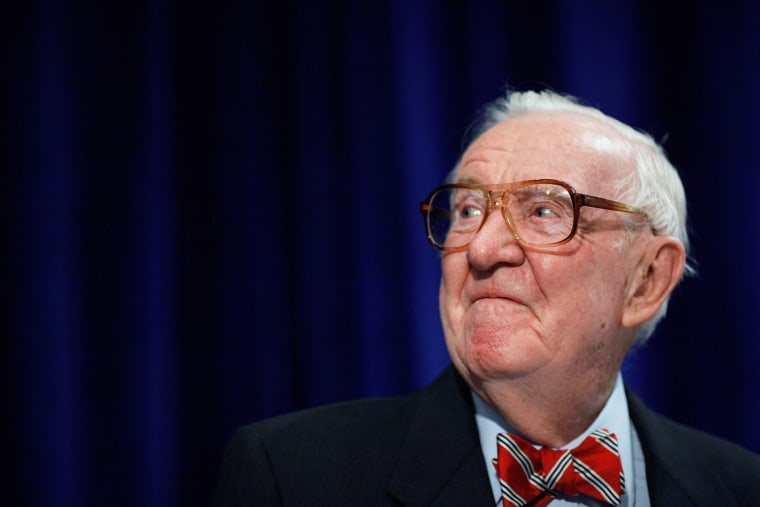The national debate over gun violence tends to ebb and flow, though the contours of the argument don't change much. Reformers urge policymakers to consider a series of ideas intended to save lives, while their opponents insist those ideas would be ineffectual and unconstitutional.
Reformers response is that the Second Amendment is not without limits, to which their opponents say that even the most modest restrictions on firearm ownership opens the door to a tyrannical dictatorship.
Once in a great while, however, someone comes along and jolts a stale debate with a provocative recommendation. Retired Supreme Court Justice John Paul Stevens, for example, wrote an op-ed for the New York Times today in which he suggests repealing the Second Amendment altogether.
Indeed, Stevens, chosen for the high court by Republican Gerald Ford, made the case that the historic foundations of the Second Amendment have been twisted over the centuries and the original concerns that led to its adoption are "a relic of the 18th century."
For over 200 years after the adoption of the Second Amendment, it was uniformly understood as not placing any limit on either federal or state authority to enact gun control legislation. In 1939 the Supreme Court unanimously held that Congress could prohibit the possession of a sawed-off shotgun because that weapon had no reasonable relation to the preservation or efficiency of a "well regulated militia."During the years when Warren Burger was our chief justice, from 1969 to 1986, no judge, federal or state, as far as I am aware, expressed any doubt as to the limited coverage of that amendment. When organizations like the National Rifle Association disagreed with that position and began their campaign claiming that federal regulation of firearms curtailed Second Amendment rights, Chief Justice Burger publicly characterized the N.R.A. as perpetrating "one of the greatest pieces of fraud, I repeat the word fraud, on the American public by special interest groups that I have ever seen in my lifetime."
The legal debate, however, changed in 2008, with a case called District of Columbia v. Heller.
As longtime readers may recall, the high court's five-member conservative majority struck down D.C.'s ban on handgun ownership and sought to answer a key constitutional question: does the Second Amendment protect an individual's right to "keep and bear arms," or is it a collective right belonging to well-regulated militias?
The Supreme Court, in a ruling written by Justice Antonin Scalia, sided with the former over the latter. Stevens, two years before his retirement, dissented.
He still thinks Heller was wrong, and in his op-ed, Stevens added that the court's decision became "a propaganda weapon of immense power," wielded by the NRA.
His piece went on to say, "Overturning that decision via a constitutional amendment to get rid of the Second Amendment would be simple and would do more to weaken the N.R.A.'s ability to stymie legislative debate and block constructive gun control legislation than any other available option."
I'm not inclined to argue constitutional law with the likes of John Paul Stevens, but it's probably worth emphasizing that many of the key objectives of reformers -- background checks, age limits, prohibitions on civilian ownership of semiautomatic weapons, bans on high-capacity magazines, et al -- don't require a repeal of the Second Amendment. In fact, I'm not even sure they'd conflict with the Heller precedent.
Putting aside some of the core issues at stake in the 2008 ruling, let's not forget that Scalia's 5-4 decision may have been celebrated by the right, but it nevertheless endorsed "longstanding prohibitions" on firearm ownership from felons and the mentally ill, bans on guns in government buildings, limits on the commercial sale of guns, and bans on "dangerous and unusual weapons," including "M-16 rifles and the like."
In other words, the kinds of proposals reformers are demanding are entirely in line with the kind of constitutional framework Scalia articulated a decade ago -- a framework the right claimed to support.
I mention this, not to contradict Stevens, but to reject the idea of a binary choice between repealing the Second Amendment and leaving the status quo in place indefinitely. The same changes sought by leaders of the March for Our Lives could be approved immediately by lawmakers and could withstand a legal challenge from the NRA and its allies.
What stands in the way is not the Second Amendment, but the political will of officials currently in office.
